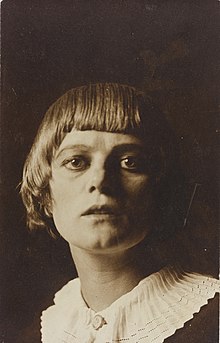Emmy Hennings
This article needs additional citations for verification. (January 2017) |
Emmy Hennings | |
|---|---|
 | |
| Born | Emma Maria Cordsen 17 January 1885 |
| Died | 10 August 1948 (aged 63) Sorengo, Switzerland |
| Nationality | German |
Emmy Hennings (born Emma Maria Cordsen, 17 January 1885 – 10 August 1948) was a German poet and performing artist, founder of the Dadaist Cabaret Voltaire with her second husband Hugo Ball.
Known as the "start of the show," countless creative works have been inspired by her life, including a best-selling novel, a graphic novel, short films, visual arts and countless other works. "Suddenly my great-grandmother is on YouTube – although for a long time she was only considered an ecstatic groupie"[1]
Life and work
[edit]Hennings was born on 17 January 1885 in Flensburg, German Empire,[2] describing herself later as "a seaman's child".[3]
After the end of her first marriage in 1906, Hennings was an itinerant performer, traveling over much of the European continent.[3] She was a performer at the Cabaret Simplizissimus in Munich, when she met Ball in 1913.[4] At the time, Hennings was already a published poet, whose works had appeared in the left-wing publications Pan and Die Aktion. In 1913 she also published a short poetry collection called Ether Poems, or Äthergedichte in German. Later, Hennings was a collaborator to the magazine Revolution, which was founded by Ball and Hans Leybold.[citation needed]
Hennings and Ball moved to Zürich in 1915, where they took part in the founding of the Cabaret Voltaire, which marked the beginning of the Dada movement.
Prior to the founding of the Cabaret Voltaire, the two struggled to make a living in Zürich during the early days of WW1. They toured, performing mostly in hotels around Switzerland. Hennings sang, did puppetry, and danced to music composed by Ball. She also recited her own poetry. In 1916 Ball and Hennings created Arabella, their own ensemble troupe, where Hennings performed under the name Dagny.
On 5 February 1916, Hennings and Hugo founded the Cabaret Voltaire at Spiegelgasse 1, 8001 Zürich. Hennings was a regular performer at the Cabaret Voltaire.[5] Her performances included a role in Das Leben des Menschen (the Life of a Man), in which she appeared with Ball. This was the German premiere of the play by Leonid Andreev. Hennings also performed in a piece written by Ball, called Krippenspiel.
Hennings married Ball on 21 February 1920. They had no children together. However, Hennings had a daughter, Annemarie, from a previous relationship, who took fondly to Ball. Hennings, who outlived Ball by two decades, lived in Magliaso, Switzerland from 1942 to 1948. She died on 10 August 1948 at a clinic in Sorengo, Switzerland.[6][2]
Dada star
[edit]In The Magic Bishop: Hugo Ball, Dada Poet, author Erdmute Wenzel White writes that Hennings “was admired by expressionists as the incarnation of the cabaret artist of her time... The shining star of the Voltaire, according to the Züricher Post (Zürich Post), her role in Dada has not been adequately acknowledged.” (p. 11).
White also cites a poem by Johannes Becher which he uses as evidence that Emmy served as a muse for other artists of the time:
"It was in Munich, at the Café Stefanie,
Where I recited for you, Emmy, poems
That I dared tell only you,"
Pop culture
[edit]The novel, "What was Beautiful and Good" tells the story of Emmy Hennings as she navigates the early days of World War 1. Driven to find purpose amidst the chaos, the novel transports readers to a turbulent era where art becomes a beacon of hope, defying the darkness of war and igniting a global artistic revolution named "Dada".[7]
References
[edit]- ^ Schütt, Julian (2023-12-02). "Dadaistin und Kriegsgegnerin – Emmy Hennings, meine Urgrossmutter". St. Galler Tagblatt (in German). Retrieved 2024-11-29.
- ^ a b "Emmy Hennings". Women in German Expressionism. 3 August 2018. Retrieved 21 August 2020.
- ^ a b Rugh, Thomas (1981). "Emmy Hennings and the Emergence of Zurich Dada". Woman's Art Journal. 2 (1). Woman's Art Inc. (subscription required): 1–6. doi:10.2307/1357892. JSTOR 1357892.
- ^ "Emmy Ball-Hennings". Fembio.org (in German). Retrieved 21 August 2020.
- ^ "Emmy Hennings". Author Gallery. Brigham Young University. 3 October 2018. Retrieved 21 August 2020.
- ^ Bärbel Reetz. Emmy Ball-Hennings: Leben im Vielleicht. Frankfurt: Suhrkamp, 2001, p. 331-332
- ^ 6 Jill Blocker. "What was Beautiful and Good." 2024. USA ISBN 978-1916964334 (DE edition: Münster Verlag, "Was schön war und gut" 2023, Zürich. ISBN 978-3907301616.
Sources
[edit]- Flight Out of Time: A Dada Diary, by Hugo Ball
- Emmy Ball-Hennings: Leben im Vielleicht by Bärbel Reetz. Frankfurt: Suhrkamp, 2001
- Emmy Ball-Hennings: Wege und Umwege zum Paradies: Biographie by René Gass. Zürich: Pendo, 1998
- The Magic Bishop: Hugo Ball, Dada Poet by Erdmute Wenzel White
External links
[edit]- Publications by and about Emmy Hennings in the catalogue Helveticat of the Swiss National Library
- "Literary estate of Emmy Hennings". HelveticArchives. Swiss National Library.
- Works by Emmy Hennings at Project Gutenberg
- Works by Emmy Hennings at LibriVox (public domain audiobooks)

- The-artists-org short bio,links Archived 2016-03-03 at the Wayback Machine
- Dancer poem with translation
- Salisbury Theatre University short bio Archived 2005-11-01 at the Wayback Machine
- Links to some poems
- Facsimile of Hennings' poem collection, Die letzte Freude (in German)

